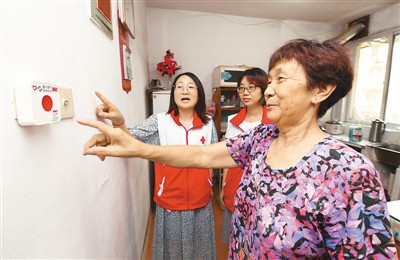China upgrades people's housing conditions through multiple channels in past five years

Volunteers teach an elderly resident how to use a calling device in a public rental housing unit in a community in Wuxing district, Huzhou city, east China's Zhejiang Province, July 22. (Photo/Xinhua)
China established the world's largest housing security system during its 13th Five-Year Plan period (from 2016 to 2020), markedly improving housing conditions for its people.
The country mobilized resources to provide more affordable housing through various channels, such as renovating dilapidated rural houses, rebuilding houses in rundown urban areas, and developing public rental housing and relevant supporting infrastructure.
Statistics from the Ministry of Housing and Urban-Rural Development show that over the past five years, over 23 million housing units were rebuilt in rundown urban areas across the country, helping over 50 million residents move from sub-standard accommodation to new apartments. By the end of 2020, more than 38 million people in straitened circumstances had moved into public rental housing units, and over 22 million people with limited means had received rental subsidies.
"Thanks to the country's poverty alleviation efforts, some 25.68 million impoverished people from 7.9 million households have seen their dilapidated houses renovated," said Pan Wei, an official with the ministry's department of housing security.
Xiaoxu village, Liuhu town, Dongying city in east China's Shandong province, addressed villagers' needs for better housing conditions by renovating their dilapidated houses on a case-by-case basis, allowing them to live in better conditions in a relatively short period of time.
"My new house is great and very comfortable," said 74-year-old villager Cui Xiuying, noting that her old house was dilapidated and the roof would leak when it rained.
A similar story could be seen in Lianxing new village, Wuyuan county, Bayannur, in north China's Inner Mongolia Autonomous Region. All 457 households there now live in new houses with solar photovoltaic panels installed on roofs, thanks to a poverty-relief relocation program and a photovoltaic power generation project. In addition, cement and asphalt roads have replaced unsurfaced ones, and villagers now have access to natural gas.
Since 2007, Tengchong city in southwest China's Yunnan Province has built 9,910 units of government-subsidized urban housing and allocated 9,621 units to eligible applicants. The city had rebuilt 6,651 housing units in rundown areas and granted rental subsidies of over 4.14 million yuan (about $636,318) to 1,614 households. All the measures effectively addressed housing problems, particularly for groups such as middle and low-income families and migrant workers.
Chen Yanhui, a migrant worker who used to live with three generations of her family in a rented room in Tengchong, has moved into a public rental housing unit in a clean and tidy community. "I'm grateful to the government for providing such a comfortable apartment for me," she said.
Wuhan city in central China's Hubei province renovated its biggest rundown urban area, turning it into a community with a significantly improved appearance and living environment, and easy access to public transportation.
Wuhan plans to renovate another 300 old urban residential communities by the end of 2021, and by the end of 2025, will strive to finish the rebuilding of old residential areas that were built before the end of the year 2000.
"For China, a country with a population of 1.4 billion, it is hard to draw any experience from other countries as it advances its urbanization at an exceptionally fast pace. In this sense, China's achievements in providing affordable housing for its people is a miracle in the world," said Yu Xiaofen, the vice president of Zhejiang University of Technology in Hangzhou city, east China's Zhejiang province.
That view was echoed by Huang Hui, senior analyst at the research institute of China's online housing platform Beike. China, as a developing country, has established the world's largest housing security system, which is a truly remarkable achievement, Huang said.
Going forward, the country will further accelerate the development of government-subsidized rental housing and resolutely implement the long-term housing mechanism, according to a teleconference on developing rental housing and facilitating real estate market regulation on July 22.
Photos
Related Stories
- China's housing ministry moves to stabilize city real estate
- Chinese vice premier urges development of government-subsidized rental housing
- China's housing market remains stable in June
- China to solve prominent housing problems in big cities: key meeting
- China's housing prices remain stable in November
- China's property investment up 6.3 pct in Jan.-Oct. period
- China's housing prices remain stable in October
- China makes notable improvements in its housing conditions
- Carrie Lam promises more housing, fund to address Hong Kong's housing woes
- Vice premier stresses healthy housing market development
Copyright © 2021 People's Daily Online. All Rights Reserved.










